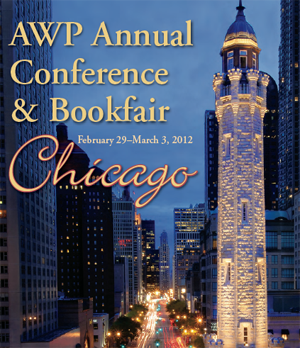The Tech-Empowered Writer (AWP Panel Resources)
This week I'll be in Chicago for the Association of Writers & Writing Programs annual conference. I'm a panelist on "The Tech-Empowered Writer" on Thursday at 1:30 p.m. This post serves as a handy resource for anyone who attends the panel, plus all of you who will miss it.
Think beyond the [analog] book
Traditional authorship focuses on the traditional publication of books or articles, with everything else viewed as ancillary. This is very narrow or limited thinking when considering how many ways a message or story can be spread in today's tech-driven world.
How can your story or message be adapted, expanded, or shared across a variety of media?
Think broadly about your strengths to reach and engage with readers across a variety of channels.
The future of reading does not equal the future of print. Don't limit yourself to books/articles/text. Consider how you can offer diverse experiences.
Diverse experiences might involve:
Videos
Podcast / audio
Livecasting
Screencasts, webinars, and online tutorials
In-person events or experiences
Online education and curriculum
Online communities
Websites and blogs
Electronic newsletters and serials
Mobile and tablet applications
Digital downloads
Wikis
Brainstorm questions
How do people typically or conventionally experience your writing or teaching?
Where and when do they typically experience it or consume it?
Could your work be adapted into mediums that are more convenient or powerful for your readers?
What kind of interaction or customization is possible?
How could your content be amplified or expanded online?
Video & audio
YouTube is the No. 2 search engine. Think about that for a minute. Nearly all major companies have their own branded channel on YouTube. You can too.
Most people will not watch a video more than a few minutes long. For long videos, provide timestamps of when certain questions/issues are discussed.
Anyone can distribute a podcast for free via iTunes. Consider: There are many people in this world who consume their content strictly via audio (due to a long commute and/or active lifestyle).
Live shows can be produced through BlogTalkRadio.
You can also do "microcasts" through services like AudioBoo and CinchCast (available as smartphone apps for recording interviews on the go).
Google Hangouts: Free instant video chat group with whomever you'd like to invite who's a Google Plus user. All you need is a webcam.
Other content/multimedia tools to consider
Blurb Mobile. Tells stories through photos, video, and audio that you've captured through your iPhone.
Cowbird. Tell stories like you've never told them before. (You'll have to go experience it; not like any other storytelling tool I've seen.)
Jing (Screencast). Record what's happening on your screen, along with audio.
iBooks Author. Create multimedia e-books with Apple's free software. Uses drag-and-drop functionality—you don't need to be a programmer, but you must be a Mac user.
PressBooks. Create e-books that live online and/or create books that you can export as EPUB files (standard e-book format).
Slideshare. Share slide-based presentations.
Ustream. Stream video live from anywhere (even from your smartphone).
Broadcastr. Record stories tied to a specific geographic location.
PBWorks. Create a wiki to collaborate with others, either publicly or privately.
Scribd. Easily share or distribute PDF documents, either free or paid.
MailChimp. Start a professional looking e-newsletter, for free up to 2,000 names.
FourSquare. Create themed lists of places you love, anywhere in the world. Must be a FourSquare user.
Easy site-building tools
Click here to read my e-newsletter on this topic. Three helpful tools you should be aware of:
WordPress (can support a full-fledged website, but easy enough for a one-page site or simple blog)
Tumblr (lightweight and easy)
About.me (for a splash page)
Curation: Sometimes a better option than creation
The world's information is doubling every two years. Sometimes, it's better when we avoid adding to the noise, and instead make sense of what already exists.
Kevin Sablan: "Curation is not simply the act of collecting disparate items and sloppily slopping theme together."
Curation is a service. It provides context and analysis, and helps people discover things they might not have found on their own. It should probably save people's time, or otherwise entertain and delight.
Everyone is a curator to some extent. Think about what you choose to post on Facebook or share on Twitter. You're making selections for a specific audience.
Specific and popular curation tools: Tumblr, Storify, Paper.li, Scoop.it, Pinterest
Some of my posts that might help you
Build a More Effective Author Website
10 Questions to Ask Before Committing to Any E-Publishing Service
3 Free Books to Open Your Eyes to the Future of Authorship
12 Must-Read Articles From 2011 (where I link to articles by other people, mostly dealing with issues related to new media and authorship)
5 Keys to Writing for an Online Audience
Published on February 29, 2012 02:00
No comments have been added yet.
Jane Friedman
The future of writing, publishing, and all media—as well as being human at electric speed.
- Jane Friedman's profile
- 1882 followers




